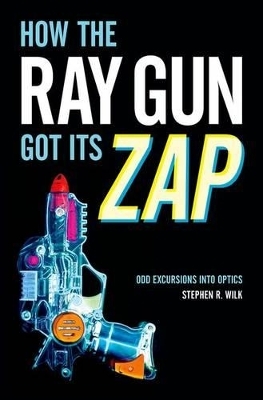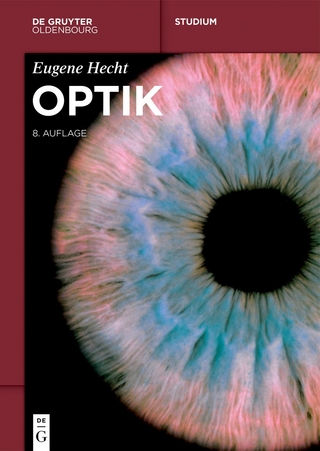
How the Ray Gun Got Its Zap
Oxford University Press Inc (Verlag)
978-0-19-994801-7 (ISBN)
How the Ray Gun Got Its Zap is a collection of essays that discusses odd and unusual topics in optics. Though optics is a fairly specialized branch of physics, this book extracts from the discipline topics that are particularly interesting, mysterious, culturally relevant, or accessible. The essays all first appeared, in abbreviated form, in Optics and Photonics News and in The Spectrograph; the author has updated and expanded upon each of them for this book. The book is divided into three thematic sections: History, Weird Science, and Pop Culture. Chapters will discuss surprising uses of optics in classics and early astronomy; explain why we think of the sun as yellow when it is actually white; present how the laser is used in popular film; and profile the eccentric scientists who contributed to optics. The essays are short and entertaining, and can be read in any order. The book should appeal to general audiences interested in optics or physics more generally, as well as members of the scientific community who are curious about optics phenomena.
Stephen Wilk is a contributing editor for the Optical Society of America and the author of Medusa: Solving the Mystery of the Gorgon (OUP; 2000). He holds a Ph.D. in Physics and has worked on Laser Propulsion and High Energy Lasers at Textron and MIT's Lincoln Labs, and has designed and built optical apparatus at Optikos Corporation, Cognex, and AOtec. He was previously a visiting professor at Tufts and a visiting scientist at MIT.
Table of Contents ; Introduction ; I. History ; 1.) Ancient Optics - Magnification Without Lenses ; 2.) The Solar Weapon of Archimedes ; 3.) Claudius Ptolemy's Law of Refraction ; 4.) Antonio de Ulloa's Mystery ; 5.) The Miracle of St. Gascoigne ; 6.) Rays of the Sun ; 7.) Roy G. Biv ; 8.) George Christoph Lichtenberg ; 9.) Hopkinson's Silk Handkerchief ; 10.) First Light - Thomas Melville and the Beginnings of Spectroscopy ; 11.) Mediocrity and Illumination ; 12.) Even If You Can't Draw a Straight Line ; 13.) A Sea Change ; 14.) Thomas Pearsall and the Ultraviolet ; 15.) If at First You Don't Succeed ; 16.) More than a Burner ; 17.) Apply Light Pressure ; 18.) Sound Movies, the World's Fair, and Stellar Spectroscopy ; 19.) Deja vu ; 20.) The Magic Lantern of Omar Khayyam ; II. Weird Science ; 21.) The Yellow Sun Paradox ; 22.) Once in a Blue Moon ; 23.) Chromatic Dispersions ; 24.) The Eye in the Spiral ; 25.) Retroreflectors ; 26.) Yes, I was Right! It is Obvious! ; 27.) Edible Lasers ; 28.) Pyrotechnic Lasers ; 29.) Defunct Lasers ; 30.) The Phantom Laser ; 31.) The Case of the Oily Mirrors; A Locked Room mystery ; 32.) Pinhole Glasses ; 33.) Undulations ; III. Pop Culture ; 34.) This is Your Cat on Lasers ; 35.) Dord ; 36.) Zap! ; 37.) Mystic Cameras ; 38.) Playing With Light ; 39.) I Must Find That Tractor Beam ; 40.) The Rise and Fall and Rise of the Starbow ; 41.) Diamonds in the Dark ; 42.) A Popular History of the Laser ; 43.) Pop Culture Errors in Optics ; 44.) Pop Spectrum ; 45.) The Telephote ; Afterword
| Erscheint lt. Verlag | 28.11.2013 |
|---|---|
| Zusatzinfo | 5 b/w halftones, 2 tables |
| Verlagsort | New York |
| Sprache | englisch |
| Maße | 242 x 163 mm |
| Gewicht | 503 g |
| Themenwelt | Sachbuch/Ratgeber ► Natur / Technik |
| Naturwissenschaften ► Physik / Astronomie ► Optik | |
| ISBN-10 | 0-19-994801-1 / 0199948011 |
| ISBN-13 | 978-0-19-994801-7 / 9780199948017 |
| Zustand | Neuware |
| Haben Sie eine Frage zum Produkt? |
aus dem Bereich


